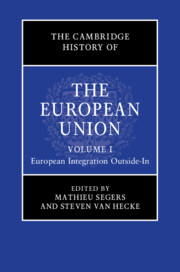Book contents
- The Cambridge History of the European Union
- The Cambridge History of the European Union
- The Cambridge History of the European Union
- Copyright page
- Contents
- Figures
- Contributors to Volume I
- Acknowledgements
- Abbreviations
- Reflections on the History and Historiography of European Integration
- Part I Critical Junctures
- Part II Multilateralism and Geopolitics
- Market, Society and Security
- Global Challenges: International Politics, the Planet and the Universe
- 13 European Integration and the United Nations
- 14 The European Nuclear Dimension: From Cold War to Post-Cold War
- 15 From ‘Helsinki’ and Development Aid to Multipolar Hard Ball
- 16 European Integration, the Environment and Climate Change
- 17 The Space Policy of the European Union
- Part III Perspectives and Ideas
- Index
- References
14 - The European Nuclear Dimension: From Cold War to Post-Cold War
from Global Challenges: International Politics, the Planet and the Universe
Published online by Cambridge University Press: 21 October 2023
- The Cambridge History of the European Union
- The Cambridge History of the European Union
- The Cambridge History of the European Union
- Copyright page
- Contents
- Figures
- Contributors to Volume I
- Acknowledgements
- Abbreviations
- Reflections on the History and Historiography of European Integration
- Part I Critical Junctures
- Part II Multilateralism and Geopolitics
- Market, Society and Security
- Global Challenges: International Politics, the Planet and the Universe
- 13 European Integration and the United Nations
- 14 The European Nuclear Dimension: From Cold War to Post-Cold War
- 15 From ‘Helsinki’ and Development Aid to Multipolar Hard Ball
- 16 European Integration, the Environment and Climate Change
- 17 The Space Policy of the European Union
- Part III Perspectives and Ideas
- Index
- References
Summary
Studying the relationship between the process of European integration and nuclear energy means coming to grips with two of the central issues of the international system that emerged from the Second World War. Ever since the fateful dropping of two nuclear weapons on Hiroshima and Nagasaki, one of the key questions of international politics has been whether the power of the atom is compatible with a world of nation states or whether its immense destructiveness needs a radical rethinking of the international system and the creation of some form of supranational framework to manage it. But is the atom really shareable, or – as General de Gaulle supposedly said – le nucléaire ne se partage pas? Such a question is obviously linked to the second issue, namely what can be achieved by the experiment of European integration. How far can it go? How much of their traditional powers are European nation states willing to abandon, and how far are they willing to go in sharing some of their most jealously guarded national secrets and prerogatives? Can Europe truly share the management of nuclear energy, in all its scientific, civilian and military applications? And if so, to what purpose? Is the ultimate goal of European integration the restoration of a Europe puissance or something else?
- Type
- Chapter
- Information
- The Cambridge History of the European Union , pp. 366 - 392Publisher: Cambridge University PressPrint publication year: 2023



